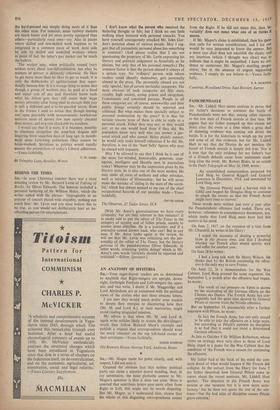BEHIND THE TIMES
SIR,—In your Christmas number there was a most amusing review by Mr. Bernard Levin of Talking of Books, by Oliver Edwards. The humour included a personal battering of Sir William Haley, which the writer ended with the phrase : 'impregnable in an armour of conceit plated with stupidity, nothing can touch him.' Mr. Levin and you must believe this to be true, as you would not deliberately hurt an un-
offending person for entertainment. . _
I don't know what the person who received the battering thought or felt; but I think no one feels nothing when battered with personal remarks. You have yourself courageously attacked Mr. John Gor- don's personal abuse of various people. May I sug- gest that all journalistic personal abuse has something in common? (And please realise that I am not questioning the propriety of Mr. Levin expressing his literary and political judgments as forcefully as he pleases, but only that of his personal remarks.) The common factor is that the person abused is always of a certain type. No 'ordinary' person, with whom readers could identify themselves, gets personally abused in the press. The personally abused are not only 'special,' but of certain particular categories. The most obvious of such categories are film stars, royalty, high society, erring priests and clergymen, Communists and convicted persons. People in all these categories are, of course, newsworthy and their public doings certainly should be reported and criticised. But what makes them specially subject to personal molestation by the press? It is that for various reasons none of them is able to reply to a personal attack. Either they may not; or they would not; or no one would heed them if they did. We journalists know very well who can answer a per- sonal attack and who cannot. Haley plainly cannot; he would only make himself ridiculous if he did. He, therefore, is one of the 'Aunt Sally' figures who may be abused with impunity.
May I be allowed to say that I think he is one of the most fair-minded, honourable, generous, cour- ageous, intelligent and likeable men in journalism today? Whatever may be the impression given by his literary style, he is also one of the most modest. He may make all sorts of esthetic and other mistakes, such as mistakes of lifemanship : but he will never make the mistake of 'sitting in the seats of the scorn- ful,' which has always seemed to me one of the chief occupational hazards of our peculiar trade.—Yours faithfully, The Observer, 22 Tudor Street, EC4 DAVID ASTOR
[With Mr. Astor's generalisations we have every sympathy; but are they relevant in this instance? It is surely odd to put the editor of The Times in the category of royalty and of fallen priests, unable to answer press criticism. He is a journalist; and if a journalist cannot answer back, who can? But in any case, if Mr. Astor looks again at the review, he will see that Mr. Levin was criticising not the per- sonality of the editor of The Times, but the literary .persona of the pseudonymous Oliver Edwards; in other words, criticising `public doings' which in Mr. Astor's own words 'certainly should be reported and criticised.'—Editor, Spectator.]






































 Previous page
Previous page